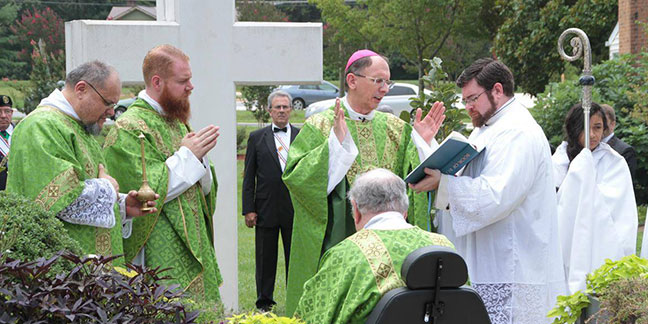Catholic cemeteries are important in the life of the Church. Here's a list of cemeteries and columbaria in the Diocese of Charlotte:
Cemeteries
St. Frances of Rome Mission, Sparta
St. Helen Mission, Spencer Mountain (parishioners only)
St. Francis of Assisi Church, Jefferson
Cemeteries with columbaria
Our Lady of Annunciation, Albemarle
Immaculate Conception Mission, Canton
Holy Family Church, Clemmons (parishioners only)
Holy Cross Church, Kernersville
Sacred Heart Church, Salisbury
St. James the Greater Church, Concord
St. John the Evangelist Church, Waynesville
Columbaria only
St. Eugene Church, Asheville (parishioners only)
St. Elizabeth Church, Boone
Sacred Heart Church, Brevard (full)
St. Joan of Arc Church, Candler (full)
St. Gabriel Church, Charlotte (full)
St. Matthew Church, Charlotte (full)
St. Peter Church, Charlotte
St. Thomas Aquinas Church, Charlotte
St. Vincent de Paul Church,
Charlotte (full)
Immaculate Heart of Mary Mission, Hayesville
St. Aloysius Church, Hickory
Christ the King Church, High Point
Immaculate Heart of Mary Church, High Point (full)
Our Lady of the Mountains Mission, Highlands
St. Paul the Apostle Church, Greensboro
St. Pius X Church, Greensboro
(full, with waiting list)
St. Margaret of Scotland Church, Maggie Valley (full)
St. Luke Church, Mint Hill (full)
St. William Church, Murphy
St. Margaret Mary Church, Swannanoa
St. Leo the Great Church,
Winston-Salem (full)
Public cemeteries with Catholic sections
Stanly Gardens, Albemarle
Sharon Memorial Park, Charlotte
Westlawn Cemetery, Clemmons
Mt. Zion Community Cemetery, Cornelius
Northlake Memorial Gardens, Huntersville
Forest Lawn East Cemetery, Matthews

Cemeteries and Columbaria Policy for the Diocese of Charlotte
'The Church earnestly recommends that the pious custom of burying the deceased be observed; nevertheless, the Church does not prohibit cremation unless it was chosen for reasons contrary to Christian doctrine.' Canon 1176, §3
Church law (Canon 1240) stipulates, “Where possible, the Church is to have its own cemeteries or at least areas in civil cemeteries that are designated for the deceased members of the faithful and properly blessed.”
Because of limited space at many parishes across the diocese, a cemetery on parish grounds is not always practicable. Identifiably Catholic sections in public cemeteries have become an alternative option, as well as columbaria on parish grounds. But columbaria for cremated remains cannot be the only option provided.
Diocesan policy states: “If a parish wishes to make a columbarium available to the faithful, it will also make available at the same location as the columbarium, spaces for burial of the bodies of the deceased. The number of spaces available for placing cremated remains in a columbarium shall not be more than the number of spaces available for burial of bodies of the deceased. The expectation is that more spaces will be available for burial of the bodies of the deceased than spaces in a columbarium for the placing of cremated remains, since burial of the body is the norm of Christian burial.”
Diocesan Policy for Cemeteries and Columbaria
Due to a desire on the part of many of the faithful to have a resting place for their earthly remains that is identifiably Catholic, various parishes in recent years have provided a columbarium on their parish campus. The limitation of space on parish campuses, however, has mostly precluded the possibility of the faithful to choose the option of burial of the body in a resting place that is identifiably Catholic.
In order to respond to the desire of many of the faithful for a resting place that is identifiably Catholic, the Diocese of Charlotte will contract for Catholic sections in local cemeteries, to provide at one location both a resting place for the bodies of the deceased and a resting place for cremated remains.
If a parish wishes to make a columbarium available to the faithful, it will also make available at the same location as the columbarium, spaces for burial of the bodies of the deceased. The number of spaces available for placing cremated remains in a columbarium shall not be more than the number of spaces available for burial of bodies of the deceased. The expectation is that more spaces will be available for burial of the bodies of the deceased than spaces in a columbarium for the placing of cremated remains, since burial of the body is the norm of Christian burial. Thus, in such case that a parish wishes to make a columbarium available to the faithful, the parish will also make available at one and the same location at least an equal number of spaces for burial of the bodies of the deceased, and preferably a greater number of spaces for burial of bodies. There is no requirement that a columbarium be constructed, since cremated remains may be buried in the ground at the cemetery. At the center of the cemetery will stand the cemetery crucifix.
The Diocese of Charlotte may also receive land or purchase land for the establishment of a Catholic cemetery.
With this policy the Diocese wishes to respond in a comprehensive way to the vision of canon 1240 to provide a resting place for the remains of the faithful departed.
Adopted March 13, 2007
Revised August 15, 2010
Diocese of Charlotte
Why is it important to have a grave?
-
Why is it important to have a grave?
Our cemeteries are places of great sign value as were the catacombs of old.
The grave and the marker are visible signs that a person did live and that it mattered that he or she lived. Years from now someone will walk by our graves and remember us and that it was important that we lived and died. Cemeteries are places of catechesis about death and they are places of prayer in the context of the communion of saints and our waiting for the final coming of the Lord.
We visit the grave often to pray for the deceased and we decorate the graves regularly, especially on Nov. 2, All Souls Day.
— "Catholic Funeral Guide," St. Michael the Archangel Church in Gastonia


